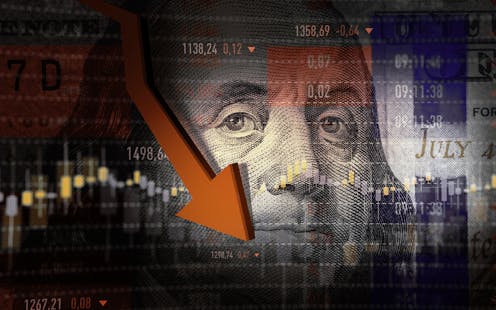
Partisan squabbling isn’t just annoying – it’s also bad for business.
That’s what my colleagues and I found in a recent study on how uncertainty in environmental policy affects business investment.
First, we analyzed more than 300 million newspaper articles, looking for keywords related to environmental policy uncertainty. We found that this uncertainty spikes around election seasons and has nearly doubled over the past decade.
Then we looked at business investment rates – a common way to gauge a company’s financial health – at companies in affected sectors, such as those in the agriculture, mining, energy and automotive industries. We found that environmental policy uncertainty lowered those companies’ business investment rates by 0.010%.
That might not sound like a lot, but as economists like me know, small sums add up over time.
For example, the rise in environmental policy uncertainty in the run-up to the 2008 presidential election was linked with a one-time drop of the investment rate of 25% for companies affected by environmental policy, we found. This effect was larger than the uncertainty associated with defense, health and finance policy.
But my team also found a silver lining. Policy uncertainty had much less of an effect on business investment when control of Congress was divided and policy changes required bipartisan support, we discovered.
When the same political party controlled both chambers of Congress, environmental policy uncertainty was associated with a 0.013% decrease in investment rates. But when Congress was split, this decrease shrank to a much smaller 0.002%.
Why it matters
Because policy uncertainty tends to spike around elections, our results suggest that the current political environment is creating headwinds for business investment.
Our study also suggests that policies designed to spur business investment may be less effective than previously thought, because of the uncertainty they introduce.
Take, for example, the Inflation Reduction Act, passed in 2021, and the bipartisan infrastructure law of 2022. Both were crafted to encourage investment in clean-energy technologies.
But uncertainty over whether these packages would pass in the first place – and, if so, what these policies would include – may have deterred investment before they went into effect. And uncertainty about what aspects of the laws will continue after the election could also depress business investment.
A degree of uncertainty may be built into the democratic process. After all, the faster and more secretive a government is, the less accountable it is to the public. If you think of it that way, some uncertainty is an unavoidable cost of a healthy policymaking process.
Our study puts a price tag on these costs and reminds policymakers that political infighting is a drag on the economy. Our results do suggest one promising path forward: bipartisanship.
What’s next
Because there’s so much variety in environmental policies, our team is now doing research to see whether businesses respond differently to uncertainty in “carrot” policies – such as subsidies or tax breaks – versus “stick” policies, such as fines or other punishments.
Answering this question will help policymakers minimize the effects of uncertainty.
It’s also an open question whether newspaper articles convey information to business leaders or simply reflect the information they already have. If it’s the latter, media coverage may not be a great measure of the uncertainty businesses face.
To address this concern, we’re working to develop ways to measure uncertainty based on earnings call transcripts instead of newspaper articles. These could be a more direct way to gauge the uncertainties influencing business decisions.
The Research Brief is a short take about interesting academic work.
Charles Sims does not work for, consult, own shares in or receive funding from any company or organization that would benefit from this article, and has disclosed no relevant affiliations beyond their academic appointment.
This article was originally published on The Conversation. Read the original article.







